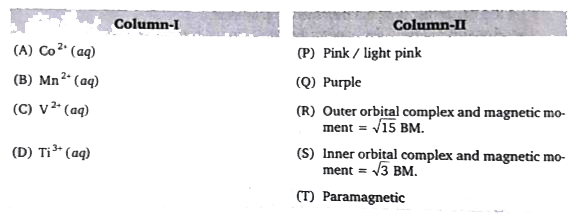Column-I and Column-II contains four entries each. Entries of column-I are to be matched with some entries of column-II. Each entry of column-I may have the matching with one or more than one entries of column-II.

The correct Answer is:A, B, C, D
Poling : Impure molten metal is stirred with green wood poles, oxide impurities are removed, mainly used for Cu and Sn.
Cupellation is used when impurities are of other metals, mainly used for silver.
Electro-refining : Cu,Ag,Au,Cr,Zn,Ni,etc., are mainly purified by removing insoluble impurities as anode mud.
van Arkel method : (vapour phase refining) Metals like titanium, zirconium, thorium and uranium are purified by this method.
Topper's Solved these Questions
- BOOK - VK JAISWAL ENGLISHCHAPTER - METALLURGYEXERCISE - ASSERTION-REASON TYPE QUESTIONS29videos
METALLURGY
- BOOK - VK JAISWAL ENGLISHCHAPTER - METALLURGYEXERCISE - One OR MORE ANSWERS IS/ ARE CORRECT76videos
METALLURGY
- BOOK - VK JAISWAL ENGLISHCHAPTER - ENVIRONMENTAL CHEMISTRYEXERCISE - ASSERTION-REASON TYPE QUESTIONS14videos
ENVIRONMENTAL CHEMISTRY
- BOOK - VK JAISWAL ENGLISHCHAPTER - p-BLOCK ELEMENTSEXERCISE - SUBJECTIVE PROBLEMS35videos
p-BLOCK ELEMENTS
Similar Questions
Entries of Column-I are to be matched with entries of Coloumn-II. Each entry of Column-I may have the matching with one or more than one entries of Column-II.
 View Solution
View SolutionEntries of Column-I are to be matched with entries of Coloumn-II. Each entry of Column-I may have the matching with one or more than one entries of Column-II.
 View Solution
View SolutionEntries of Column-I are to be matched with entries of Coloumn-II. Each entry of Column-I may have the matching with one or more than one entries of Column-II.
 View Solution
View SolutionEntries of Column-I are to be matched with entrices of Column-II. Each entry of Column-I may have the matching with one or more than entries of Column-II
 View Solution
View SolutionEntries of Column-I are to be matched with entrices of Column-II. Each entry of Column-I may have the matching with one or more than entries of Column-II
 View Solution
View SolutionEntries of Column-I are to be matched with entrices of Column-II. Each entry of Column-I may have the matching with one or more than entries of Column-II
 View Solution
View SolutionEntries of Column-I are to be matched with entrices of Column-II. Each entry of Column-I may have the matching with one or more than entries of Column-II
 View Solution
View SolutionEntries of Column-I are to be matched with entrices of Column-II. Each entry of Column-I may have the matching with one or more than entries of Column-II
 View Solution
View SolutionColumn -I and Column -II contain four entries each. Entries of column-I are to be matched with some entries of column-II. One or more than one entries of column-I may have the matching with the same entries of column-II.
 View Solution
View SolutionColumn -I and Column -II contain four entries each. Entries of column-I are to be matched with some entries of column-II. One or more than one entries of column-I may have the matching with the same entries of column-II.
 View Solution
View Solution

